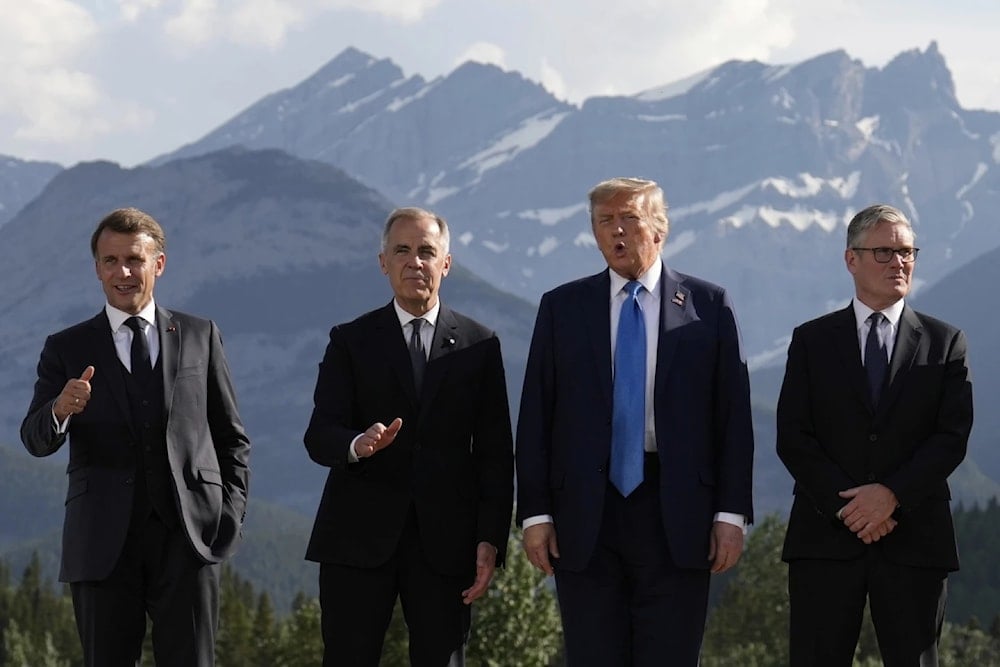G7 sides with aggressor, says 'Israel' has 'right to defend itself'
Reinforcing Western bias, G7 calls on Iran to de-escalate while backing "Israel’s" "right to defend itself," despite mounting Iranian civilian casualties.
-

A group photo of the G7 Summit, including US President Donald Trump, Monday, June 16, 2025, in Kananaskis, Canada (AP/Mark Schiefelbein)
G7 leaders called Monday for a de-escalation in the escalating Israeli war on Iran, placing the burden largely on Iran while reiterating their support for what they blatantly called "Israel’s right to defend itself." The summit’s diplomatic posture raised questions over the group's bias, particularly after US President Donald Trump abruptly left the gathering a day early amid intensified Israeli strikes on Iran.
Referring to the Israeli attacks and Iran's retaliatory strikes as an exchange of "hostilities", the joint statement released by Canada read, "We urge that the resolution of the Iranian crisis leads to a broader de-escalation of hostilities in the Middle East, including a ceasefire in Gaza."
It highlighted that Israel "has a right to defend itself" and stressed "the importance of the protection of civilians," although "Israel" initiated the attacks unprovoked and targeted civilians and civilian infrastructure since day one, with the latest insolent attacks targeting Iran's state broadcaster and Al-Farabi Hospital.
Read more: ‘Israel’ targets civilians in Tehran; mothers rush in with wounded kid
The seven-nation group, comprising Britain, Canada, France, Germany, Italy, Japan, and the United States, also restated their stance that Iran “can never have a nuclear weapon,” while remaining silent on "Israel’s" unacknowledged but widely known nuclear arsenal and completely ignoring the fact that Iran never sought one.
Trump sparks speculations
Trump, returning to the global stage at the Canadian-hosted G7 summit, posted a stark warning on his social media platform, Truth Social: “Everyone should immediately evacuate Tehran!” The statement triggered alarm and added weight to speculation about direct US involvement or support for ongoing Israeli operations against Iran.
After initial hesitation, Trump agreed to a joint G7 statement, released during a dinner in Kananaskis, Canada. The communique urged resolution of the “Iranian crisis” but failed to acknowledge the Israeli occupation's airstrikes that precipitated the latest escalation. Instead, it reinforced “Israel’s right to defend itself” and vaguely called for “the protection of civilians.”
The carefully chosen language further shows the G7’s consistent diplomatic shield for "Israel," as the statement made no mention of the extensive Israeli bombing campaign against Iranian civilians.
Earlier this week, Israel Katz called for the deliberate killing of Iranian civilians, which was followed by an Israeli attack on an Iranian hospital on Monday. The G7 did, however, call for a ceasefire, including in Gaza, though without assigning responsibility.
Trump reinforces pro-'Israel' tilt, sidesteps US role
Although Trump has claimed to favor diplomacy, his departure from the summit and endorsement of Israeli strikes revealed where US sympathies lie.
“As soon as I leave here, we're going to be doing something,” Trump told reporters ahead of his departure. He declined to clarify whether Washington would engage militarily but emphasized that Iran should “talk immediately, before it’s too late.”
Despite US claims that its forces are in a “defensive posture", the messaging from both Trump and the G7 appeared to validate Israeli military objectives, further fueling accusations of Western double standards in Middle East diplomacy.
French President Emmanuel Macron hinted at potential diplomacy, stating, “There was an offer made for a meeting and an exchange.” He also voiced subtle criticism of Israeli ambitions to change the Iranian regime, warning that bombing campaigns have historically failed to impose regime change.
Still, Macron’s remarks were overshadowed by the joint statement’s silence on Israeli nuclear capabilities and its one-sided framing of Iran as the primary threat.
G7's credibility questioned amid rising civilian toll
As "Israel" continues to target nuclear and military facilities inside Iran, killing commanders, scientists, and civilians, the G7’s reluctance to condemn the strikes casts doubt on the bloc’s credibility as a neutral arbiter.
While Iranian forces responded with drone and missile launches on military targets mainly, the Western narrative remains focused on deterring Iran, with no equivalent scrutiny of "Israel's" aggressive military strategy or its long-held nuclear monopoly in the region.
With Trump skipping scheduled G7 sessions with leaders of Ukraine and Mexico, attention now turns to whether the US will escalate involvement militarily, either directly or through continued diplomatic backing of "Israel’s" war efforts.

 4 Min Read
4 Min Read










